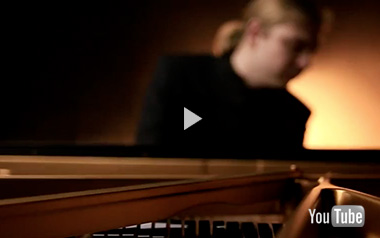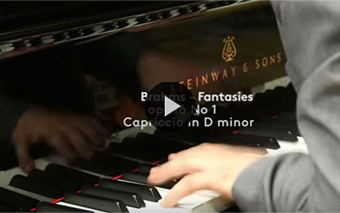Next Concerts
February 19, 2026
Odense
Odense C, Denmark
Ravel: Piano Concerto in G major, M.83
– Pierre Bleuse (conductor)
Venue: Odense Concert Hall, Odense
Mar 7, 2026
Netherlands Philharmonic / European Tour
Amsterdam, Netherlands
Brahms: Piano Concerto No.2 in B-flat major, Op.83
– Lorenzo Viotti (conductor)
Venue: The Concertgebouw, Amsterdam
REVIEWS
May 31 2014
Philharmonia Orchestra / Yuri Temirkanov / Tchaikovsky Piano Concerto No.1
“His was a serious, direct approach to the music, conveyed with seemingly effortless virtuosity and beauty of tone. In the more reflective passages of the first movement his playing had a distinctive refined elegance and it was refreshing to hear this everyday music played with such care and respect, though throughout there was an underlying strength. The slow movement was simply and straightforwardly delivered, but it had an inward, yearning quality that was touching, and there was some scintillating, quicksilver playing in the finale.”
Classical Source, May 2014
Feb 20 2014
St Petersburg Philharmonic Orchestra / Yuri Temirkanov / Tchaikovsky Piano Concerto No.1 / Carnegie Hall
“There was plenty of brilliance and dazzling passagework in his account of Tchaikovsky’s First Concerto. Yet this was a performance that highlighted the music’s Romantic musings, poetic lyricism and fanciful flights. The finale was especially good, played with refreshing lightness and bite, like a real Russian dance…The audience gave Mr. Kozhukhin a standing ovation.”
New York Times, February 2014
Feb 19 2014
Broward Center for the Performing Arts, Florida
“South Florida might not need another performance of the Tchaikovsky Piano Concerto No. 1, but if you’re going to hear this work for the 20th or 30th time, let it be with a soloist of the caliber of the young Russian pianist Denis Kozhukhin… Kozhukhin is a fiery and dramatic performer, whose daring style made the most of this concerto.
He played the huge ascending chords that accompany the opening theme in the orchestra in a forward-leaning manner that gave an extra impetus and excitement to the beginning of the work. No matter how fast and thick the notes came, his mastery of the keyboard allowed him to bring a light, sure and accurate touch that brought unusual clarity to passages that can often seem like blurs of notes. From languid melodies to fierce runs in double octaves, he embraced the concerto’s pathos and drama, with none of the obvious keyboard pounding of lesser musicians…
Kozhukhin seized center stage again in the last movement, displaying fluency at the keyboard and a fearless approach to the work’s virtuoso challenges.”
South Florida Classical Review, February 2014
Feb 18 2014
Amsterdam Concertgebouw Master Pianists Series / Brahms, Prokofiev, Haydn, Liszt
“By his final encore, the audience was lying at the feet of Denis Kozhukhin, a 27-year old pianist from Russia, who looked around cheerfully, as if it didn’t cost him any effort at all…
Kozhukhin has already shown that he belongs to the vanguard of pianists…
He started the recital with a dynamic interpretation of Haydn’s Sonata no. 59, a delightful piece, which in the first movement has this musical theme that pops up in very unexpected and different harmonic moments. Although the modern Steinway instruments are mainly too heavy for this music, Kozhukhin succeeded in making it sound crystal clear, open and did justice to Haydn’s esprit.
Kozhukhin also explored the classical side of the composer in his performance of Brahms’s first Sonata, staying well balanced even in the expansive finale which tends towards being a Galopp. More staggering was Kozhukhin’s performance Prokofiev’s ninth Sonata, a piece that constantly refers to tradition, but is also full of schizophrenic harmonies and strange connections between the main melody and the murmuring sounds of the accompaniment.
With Liszt in the second half of the recital, Kozhukhin transformed himself into a romantic piano Lion which, until now, had remained in the background. The piano perfume, the pearly arpeggios and illuminating melodic lines that feature in Liszt’s Bénédiction de Dieu dans la solitude, gave way to powerful, orchestral waves and garlands that were heard in a selection of Etudes d’exécution transcendante…
Kozhukhin certainly must return more often in the Master pianists Series.”
De Volkskrant, five stars, February 2014
Feb 12 2014
Tonhalle Zürich / Brahms Prokofiev, Haydn, Liszt
“What a talented, intelligent young pianist this is: 27-year-old Denis Kozhukhin’s Zurich Tonhalle debut as part of the venue’s Série Jeunes had the audience jumping from their seats after the closing piece – Franz Liszt’s bravura “Mazzeppa” Etude. But the evening was not just about an explosion of sheer, superhuman virtuosity, far from it…
The pianist brought a sense of impetuous youthfulness to Brahms’s early work, driving the music forward with an energy that revelled in Brahms’s virtuosity as a pianist and composer and proved that dolce did not necessarily have to mean quiet. This is a Russian with a clear idea of what he wants to do, who gave us his own dramatic and emotional view of Brahms in his quest to present a unified picture of the music as a whole. And yet Kozhukhin still showed a certain sense of style in his interpretation, with a peerless logic to the way he brought out the sometimes intricate interweaving patterns of the parts and the formal structure of the work.
After allowing only a short time for applause, he moved on to Prokofiev. The ninth sonata is certainly no crowd-pleaser. It is more of a lyrical work, with a scherzo-like, at times trenchant quality, and this is precisely what makes it so difficult to bring off in a coherent way; the few Russians to play the ninth sonata would often take considerable licence with the tempi. Here Kozhukhin showed himself to be a talented and respectful performer with a genuine grasp of the essence of the music. His skill at interpreting the work and the touching microcosm he revealed within it were astonishing… Liszt’s “Benediction de Dieu dans la solitude”, the third number from the “Harmonies poétiques et religieuses” cycle, was the highlight of the evening, a fact attested by the absolute silence in the auditorium. The same was true of the five pieces from the twelve “Etudes d’exécution transcendante”. Kozhukhin is able to play virtuoso pieces like this with consummate ease, but he uses his virtuosity to reveal aspects of Liszt’s music we have never heard before. This was a performance entirely free of showmanship, but full of energy, expression and structure.”
Alfred Zimmerlin, NZZ, February 2013
Oct 26 2013
BBC Scottish Symphony Orchestra / cond. Thomas Dausgaard / Rachmaninov Piano Concerto No. 2
“There are not enough stars in the heavens to recognise adequately the calibre of the extraordinary musical experience slammed at its capacity audience on Thursday night by the BBC SSO, conductor Thomas Dausgaard and young Russian pianist Denis Kozhukhin. So let’s settle for five and let your imagination invade the firmament for more…
A glorious interpretation of Rachmaninov’s Second Piano Concerto by Kozhukhin that had everything, but with the slush, gush and mush excised. Wonderful: a thinking person’s Rach Two; very economical on Kleenex abuse. Kozhukhin stayed on to play a life-enhancing version of Liszt’s great Benediction de Dieu dans la Solitude. Humbling beauty; now where’s that firmament?”
The Herald Scotland, October 2013
Oct 03 2013
Kölner Philharmonie / Haydn, Frank, Schubert, Hindemith, Brahms
“From the beginning until the second (and final) encore, Kozhukhin’s performance drew from the innermost sources of musical feeling and sensitivity, displaying a maturity which is quite extraordinary for his age…
Without such skills, a pianist would certainly fight a losing battle, especially when it comes to Schubert’s “Four Impromptus” (op.90). Kozhukhin, however, offered profound sincerity and animated cheerfulness, bleak resignation and heartfelt sentiment in turns…
Finally, Brahms’ “Seven Fantasies” (op. 116) were a wonder of tonal subtleties, and they were not without the sometimes necessary “paw of a lion”, like in the first or last movements. But especially moving were the contemplative, restrained “Intermezzi” (No. 2, 4 and 6) which tell of the harrowing loneliness of the aging Brahms. With Alexander Siloti’s mellow Bach transcription and Sgambati’s elegiac transcription of a melody from Gluck’s Orpheus and Euridice, the pianist from Nowgorod bid his quiet farewell.
He is not only allowed to come back, he has to come back…”
Kölnische Rundschau, October 2013


